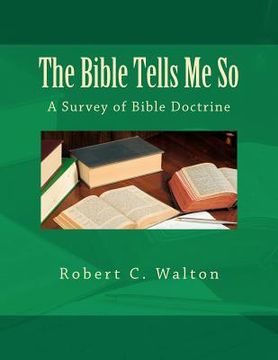Reseña del libro "the bible tells me so (en Inglés)"
Anyone looking at Scripture finds that the material in the Bible is not arranged topically. Thus the pursuit of Systematic Theology requires some justification. Why should anyone rearrange the teaching found in the Bible on the basis of some man-made scheme? First of all, the practice of Systematic Theology is supported by Scripture itself, where we find instances where those who sought to understand its teachings drew from a variety of passages in order to do so. Second, Systematic Theology is legitimized by the inspiration and unity of Scripture. The Bible is made up of sixty-six books, but is really one Book with one Author that speaks with a coherent message. In fact, if the Bible were not the work of a single Author, the topical study of it would be absurd because unity of thought would not exist. Third, Systematic Theology is justified by the progressive nature of revelation. God did not tell His people everything He intended to reveal at once, but gradually unfolded the truth, expanding on previous teachings by clarifying and illuminating them later. As a result, if we want to discover the complete teaching of the Bible on any subject, we must gather together many relevant passages in order to answer the question, "What does the Bible teach about ______?" What about the arrangement of the material in the book? Why treat subjects in the order in which they are presented in this text? The Doctrine of Scripture is the logical place to begin - if the Bible is to be our authority, we must have confidence that it is indeed the Word of God. We then seek to discover what God has revealed about Himself, and we find that He is one God in three Persons, Father, Son, and Holy Spirit, leading us to the study of the members of the Trinity. Having come to a clear understanding of who God is, we must then consider who we are, so we study the Doctrine of Man. What we find is that we are sinners alienated from God. What is to be done? We find that God has provided a solution to man's greatest need in the Gospel, which leads us to the Doctrine of Salvation. Once we see that God has called sinners to Himself, we find that His intention is to bring them together into one body, the Church, and to gather that Church into His presence forever. We thus finish the course by studying Ecclesiology and Eschatology. The reader of this book should keep several things in mind. The first is that the organization of the biblical material is artificial rather than one demanded by the text itself, and therefore attention to context is essential. Proof-texting in the study of Bible Doctrine is very easy to do. Second, be aware that many of the questions discussed in the book are ones about which Christians disagree. The faithful interpreter of Scripture must be able to discern between those clear teachings that are of the essence of the faith and those issues where our understanding of the Bible may not be as clear and sincere believers may harmoniously agree to disagree. A third reminder is that Christians must be humble enough to let God be God. Many of the doctrinal disputes that have arisen over the years stemmed from the attempt on man's part to delve into divine mysteries that God has not chosen to reveal to us. Such pursuits are dangerous; many heresies in the history of the church have grown out of the desire to present dogmatic answers to questions about which God has not spoken. Lastly, keep in mind that Bible Doctrine can never be simply a theoretical academic pursuit. The Bible never teaches abstract doctrine, but always presents ideas in the context of real-life application. So it must be for us. We must always ask the "So what?" question, seeking from our studies not only intellectual stimulation and greater understanding, but also a deeper relationship to God.

